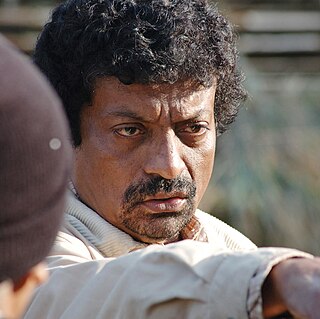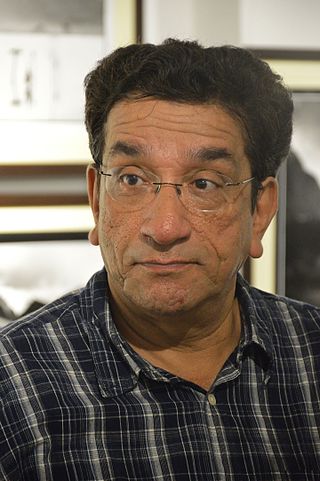Bengali Brahmos are those who adhere to Brahmoism, the philosophy of Brahmo Samaj which was founded by Raja Rammohan Roy. A recent publication describes the disproportionate influence of Brahmos on India's development post-19th Century as unparalleled in recent times.

SoumitraChatterjee was an Indian film actor, play-director, playwright, writer, thespian and poet. He is regarded as one of the greatest and most influential actors in the history of Indian cinema. He is best known for his collaborations with director Satyajit Ray, with whom he worked in fourteen films.

Goutam Ghose is an Indian film director, Actor, music director and cinematographer, who works primarily in Bengali cinema. He is the only Indian to have received the "Vittorio Di Sica" Award, Italy, in 1997.

Madhabi Chakraborty is an Indian actress. She won the National Film Award for Best Actress for her performance in the Bengali film Dibratrir Kabya. She has acted in some of the most critically acclaimed films in Bengali cinema and is considered one of the great actresses of Bengali cinema.
Robi Ghosh was an Indian actor known for his work in Bengali cinema. He is known for his comic appeal, though his versatile acting talent brought him success in various kinds of roles. He is probably one of the earliest character actors of Bengali cinema who focused mainly on method acting. Megastar in Bengali film Industry. He participated in the Berlin Film Festival as the lead actor of Goopi Gyne Bagha Byne in the role of Bagha Byne, which was one of his most memorable roles. Thereafter, he was a regular member of Satyajit Ray films over the years. Till date, he is remembered for his comic roles in different movies. Robi Ghosh was a renowned actor in Bengali theatre and TV as well. He also played a character, Badridas, in the episode Amrit ki Maut in Byomkesh Bakshi, broadcast by Doordarshan.

Karuna Banerjee was a Bengali actress best known for her role in Satyajit Ray's The Apu Trilogy (1955–1959) as the long suffering mother, Sarbajaya. She was nominated for Best Actress at the 1959 BAFTA Awards for her performance in Aparajito (1956), the second part of The Apu Trilogy. She appeared in a number of other films after that, including Ray's Devi (1960) and Kanchenjungha (1962).

Tapan Sinha was one of the most prominent Indian film directors of his time forming a legendary quartet with Satyajit Ray, Ritwik Ghatak and Mrinal Sen. He was primarily a Bengali filmmaker who worked both in Hindi cinema and Bengali cinema, directing films like Kabuliwala (1957), Louha-Kapat, Sagina Mahato (1970), Apanjan (1968), Kshudhita Pashan and children's film Safed Haathi (1978) and Aaj Ka Robinhood. Sinha started his career in 1946, as a sound engineer with New Theatres film production house in Kolkata, then in 1950 left for England where he worked at Pinewood Studios for next two years, before returning home to start his six decade long career in Indian cinema, making films in Bengali, Hindi and Oriya languages, straddling genres from social realism, family drama, labor rights, to children's fantasy films. He was one of the acclaimed filmmakers of Parallel Cinema movement of India.

Mohit Chattopadhyaya was a Bengali Indian playwright, screenwriter, dramatist and poet. He was a leading figure in modern Indian drama. Mohit Chottopadhya died on 12 April 2012. He had been suffering from cancer.

Sabyasachi Chakrabarty is an Indian actor of theatre, films and television. He is best known for portraying iconic Bengali detective characters, Feluda, and Kakababu.

Cinema of West Bengal, also known as Tollywood or Bengali cinema, is an Indian film industry of Bengali-language motion pictures. It is based in the Tollygunge region of Kolkata, West Bengal, India. The origins of the nickname Tollywood, a portmanteau of the words Tollygunge and Hollywood, dates back to 1932. It was a historically important film industry, at one time the centre of Indian film production. The Bengali film industry is known for producing many of Indian cinema's most critically acclaimed global Parallel Cinema and art films, with several of its filmmakers gaining prominence at the Indian National Film Awards as well as international acclaim.
Mitra, also called Mittra or Mitro is a Bengali Hindu surname found mostly amongst Bengali Kayastha community in the Bengal region of Indian subcontinent. This surname also has prevalence in Iran and is a popular Persian last name found in America. The surname may have been derived either from the Sanskrit word mitra meaning friend or ally or from the name of an important Indo-Iranian deity in the Vedas and in ancient Iran.

Riddhi Sen is an Indian film actor who predominantly works in Bengali films along with a few Hindi films. He is the youngest actor in India to receive the National Film Award for Best Actor for his performance in the film Nagarkirtan.
Sundaram is a Bengali theatre group, established in 1957. They have staged more than 40 productions like Fingerprint, Char Dewalergolpo, Parabas, Sajano Bagan, and Alokanandar Putra Kanya.
Partha Pratim Chowdhury (1938—1996) was an Indian Bengali actor, director, screen writer, dramatist and music director. He was widely appreciated as a director for Chaya Surya (1963) and Jadubansha (1974).
Ajitesh Bandopadhyay was an Indian actor, playwright, activist and director. He along with Shambhu Mitra and Utpal Dutt are considered to be the doyens of Bengali theatre of the post - Independence era.
Adalat o Ekti Meye is a 1981 Bengali feature film directed by Tapan Sinha, starring Tanuja in the lead role. For its powerful and sensitive presentation of rape and its effects on the life of a woman, it won the National Film Award for Best Feature Film in Bengali. In later years, it has come to be regarded as a landmark feminist film.
Atanka is a 1986 Bengali crime drama film directed by Tapan Sinha. The film stars Soumitra Chatterjee, Prosenjit Chatterjee, and Satabdi Roy in her debut film. The film was known for its dark-tone and outstanding performances of the cast. The film ran for around 90 consecutive days at Mitra cinemas, west Bengal. The film was both critically and commercially successful and won 7 awards, and got an official entry at the Indian Panorama Section.









